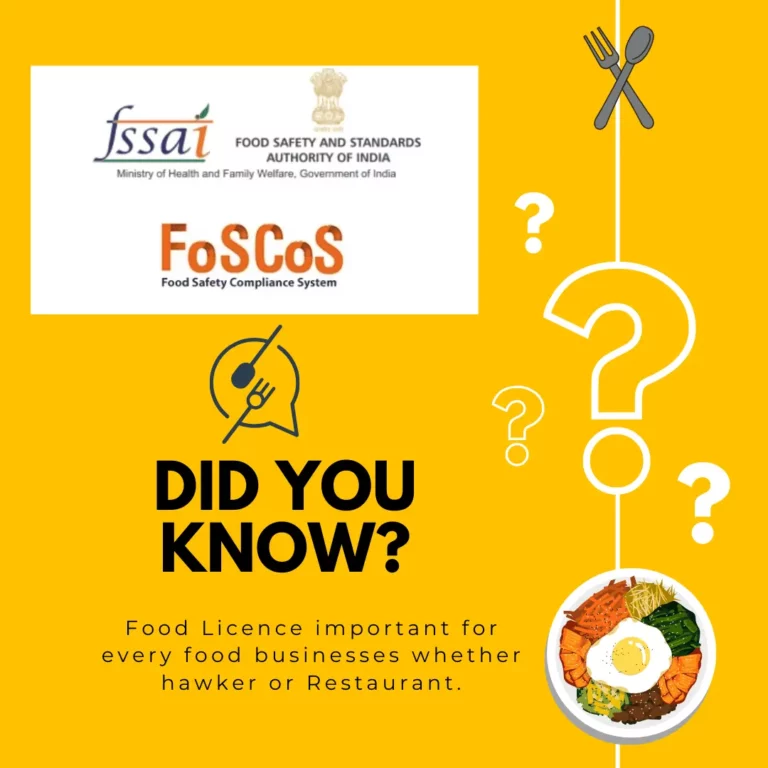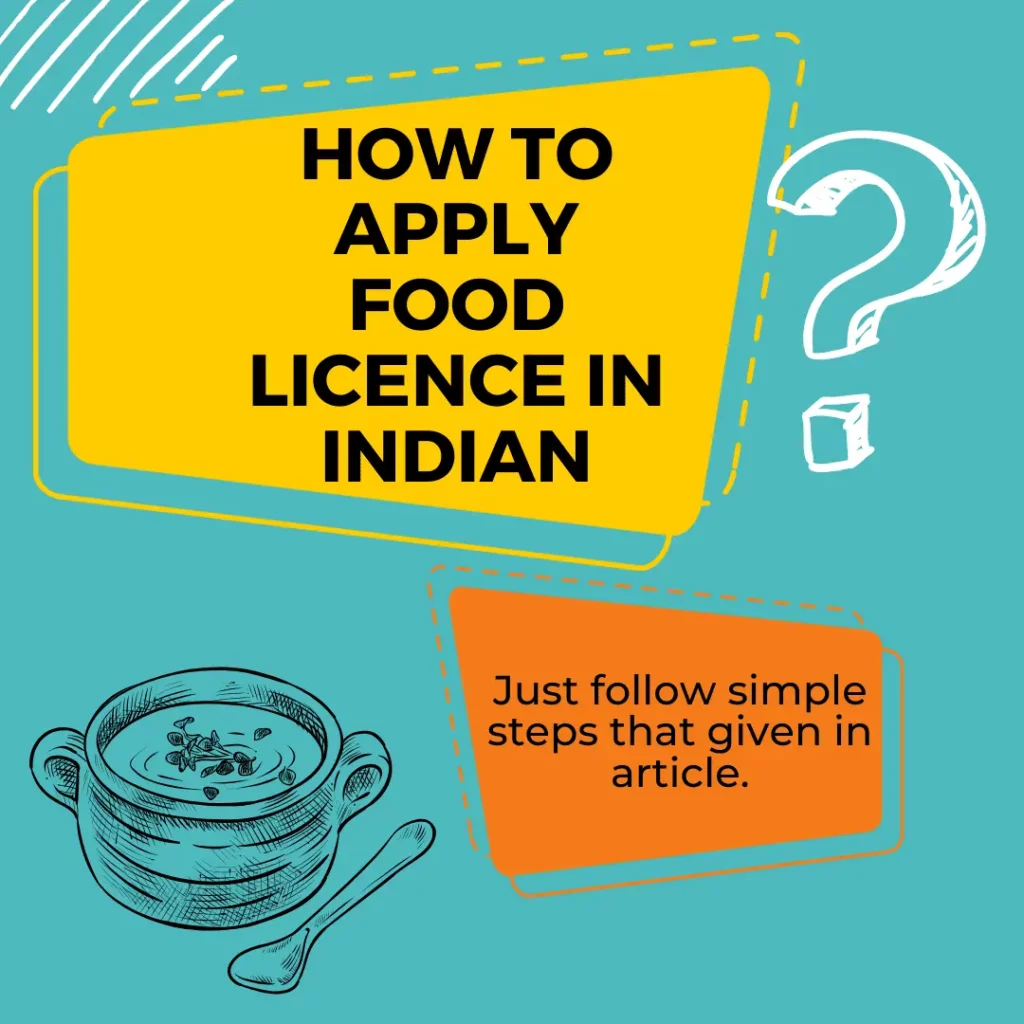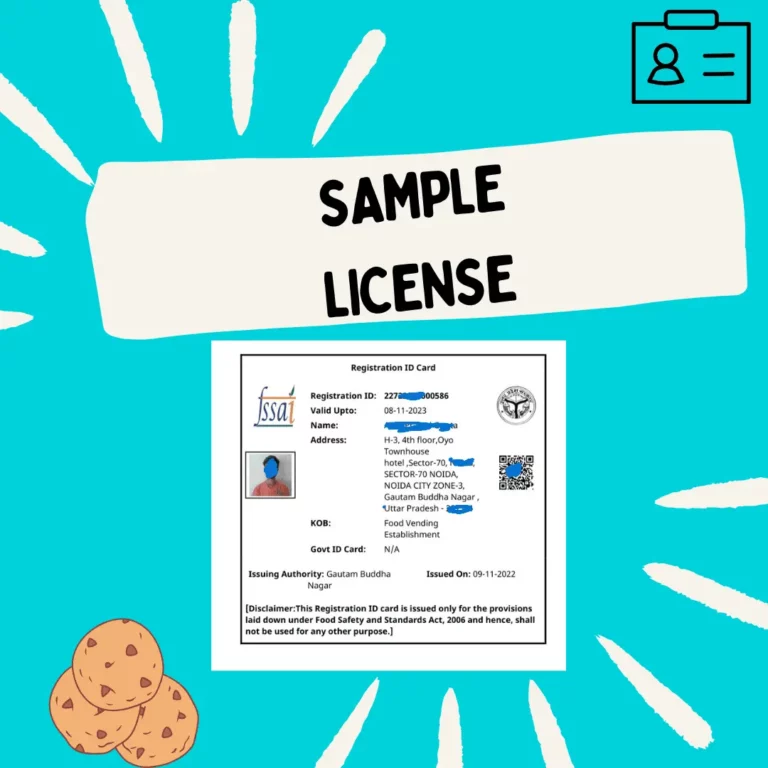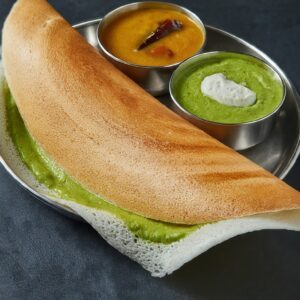Table of Contents

Food License - FSSAI
A food license is an official permit or authorization issued by regulatory bodies to individuals or businesses involved in the production, sale, or distribution of food. It acts as a certification that the food being produced or sold meets specific safety, hygiene, and quality standards set by governing authorities.
The importance of food licensing cannot be overstated. It serves as a critical safeguard for public health and safety by ensuring that the food consumed by individuals is of a certain standard. Here are a few reasons why food licensing is crucial:
- Public Health Protection: Food licensing regulations are designed to ensure that the food produced and sold to consumers is safe for consumption. This includes measures to prevent contamination, maintain hygiene standards, and minimize health risks associated with food borne illnesses.
- Quality Assurance: Licensing requirements often involve adherence to quality standards, ensuring that the food meets certain nutritional, labeling, and compositional standards. This helps in maintaining consistency and transparency in the food products available on the market.
- Consumer Confidence: When consumers see that a food establishment or product has obtained a valid food license, it instills a sense of trust and confidence in the quality and safety of the food they are purchasing. It assures them that the food has undergone scrutiny and meets specified standards.
- Legal Compliance: Operating without a food license can lead to legal repercussions. Obtaining a license ensures compliance with local, state, or national regulations, reducing the risk of penalties, fines, or potential closure due to non-compliance.
Food licensing is not just a bureaucratic requirement; it’s a fundamental aspect of ensuring that the food industry operates responsibly, safeguarding the health of consumers, and maintaining the integrity of the food supply chain.
FSSAI License
The FSSAI (Food Safety and Standards Authority of India) license is a crucial permit mandated by the Indian government for businesses engaged in food production, processing, packaging, distribution, and sale. It ensures that food businesses comply with specific quality and safety standards set by the FSSAI. We categorize the license into different types based on the scale and nature of the food business, and obtaining it is mandatory for entities operating within the food industry in India.
Health Trade License
Local municipal corporations or health departments typically issue a health trade license to various food-related establishments, including restaurants, eateries, food vendors, and other businesses involved in food handling and service. This license ensures that these establishments comply with health and hygiene standards prescribed by local governing bodies. It signifies that the establishment is safe and hygienic for food preparation, thereby safeguarding public health.
Eating House License
An eating house license is a permit required for businesses involved in serving food and beverages at specific locations, usually issued by local authorities or governing bodies. It regulates the operation of eateries, cafes, restaurants, and other similar establishments, ensuring that they meet certain criteria concerning hygiene, safety, and operational standards. This license is essential for businesses that cater to food services in designated areas.
An eating house license is a permit required for businesses involved in serving food and beverages at specific locations, usually issued by local authorities or governing bodies. It regulates the operation of eateries, cafes, restaurants, and other similar establishments, ensuring that they meet certain criteria concerning hygiene, safety, and operational standards. This license is essential for businesses that cater to food services in designated areas.
These licenses play a pivotal role in the food industry by ensuring that businesses adhere to established standards, thereby safeguarding consumer health, maintaining hygiene, and upholding the integrity of the food supply chain. Each license serves as a mark of compliance. with specific regulations, contributing to the overall safety and quality of the food products and services offered to consumers.
Eligibility Criteria
The eligibility criteria for obtaining a food license vary based on the type and scale of the food-related business. Generally, they encompass aspects such as
Nature of Business: Different licenses may be required for various activities like the manufacturing, processing, distribution, or selling of food products.
Infrastructure: The physical infrastructure of the establishment, including space, equipment, and facilities, should comply with the specified standards.
Hygiene Standards: Businesses must adhere to stringent hygiene practices, ensuring cleanliness and sanitation on their premises.
Compliance with Regulations: Compliance with local, state, or national regulations related to food safety, storage, handling, and disposal is essential.

How to apply food Licence in india 2024?
The application process involves several steps:
- Form Submission:Applicants need to fill out the required application forms accurately and completely.
- Document Submission: Along with the application, specific documents, such as identity proofs, address proofs, site plans, NOCs (No Objection Certificates), and other relevant certificates, need to be submitted.
- Inspections: Regulatory authorities may conduct on-site inspections to verify compliance with the prescribed standards and regulations.
- Fee Payment: Payment of the prescribed fee associated with the license application is usually required.
Documents Required
The documents necessary for obtaining a food license typically include:
Identity Proofs: Such as the Aadhar Card, PAN Card, or passport of the applicant.
Address Proofs: Residential or business address proofs.
Site Plans: Layout plans or blueprints of the premises where food-related activities will be conducted.
NO Objection Certificates: Obtained from relevant authorities by ensuring compliance with zoning, fire safety, and other regulations.
Food Safety Management Plan: Details about food handling, storage, hygiene practices, etc.
Business Registration Documents: such as incorporation certificate, partnership deed, or proprietorship details.
These documents serve as evidence to support the application, demonstrating that the business complies with the necessary regulations and standards set forth by the regulatory authorities. Adhering to the application procedure and providing accurate documentation are crucial steps in successfully obtaining a food license.
Legal Compliance
Obtaining a food license ensures that businesses in the food industry comply with the legal requirements set by regulatory authorities. This compliance is crucial as it helps in:
Avoiding Penalties: Operating without a food license can lead to fines, closure of the business, or legal action. Having a license ensures adherence to regulations, mitigating the risk of penalties.
Regulatory Adherence: By obtaining a license, businesses signal their commitment to following standards and guidelines set by governing bodies, promoting a culture of legal compliance within the industry.
Lorem ipsum dolor sit amet, consectetur adipiscing elit. Ut elit tellus, luctus nec ullamcorper mattis, pulvinar dapibus leo.
Consumer Trust and Confidence
A valid food license significantly impacts consumer perceptions, fostering trust and confidence in the products or services offered by a business. Here’s how:
Assurance of Safety: Consumers view a food license as an assurance that the food they purchase meets specified safety and quality standards.
Transparency and Credibility: It demonstrates a commitment to transparency and credibility, building a positive image and reputation among consumers.
Peace of Mind: it sources knowing that the food from a licensed establishment gives consumers peace of mind regarding its safety and quality.
Business Growth Opportunities
Having a food license opens doors to various growth opportunities for food-related businesses.
Market Access: A valid license enables businesses to access wider markets, as many distributors, retailers, and larger establishments prefer to collaborate with licensed entities.
Partnerships and Collaborations: It facilitates partnerships with other businesses, allowing for collaborations and expansions into new territories or product lines.
Compliance as a Competitive Edge: Compliance with licensing requirements can become a competitive advantage, enhancing a business’s reputation and attracting more customers.
The benefits of having a food license extend beyond mere legality. It engenders consumer trust, fosters business growth, and positions the licensed establishment favorably in the competitive food industry landscape.
Absolutely, navigating obtaining a food license can present several challenges
Complex Procedures
The procedures involved in securing a food license often entail various intricate steps:
Documentation Requirements: The process usually demands an array of specific documents, and understanding which ones are necessary for a particular license can be complex.
Application Steps: Following the right sequence of steps, filling out forms accurately, and meeting deadlines can be challenging without a clear understanding of the process.
Regulatory Variations: Different regions or types of licenses may have distinct requirements, adding to the complexity of the process.
Compliance with Regulations
Complying with the extensive regulations governing food licenses can pose hurdles.
Understanding Regulations: Regulations can be detailed and subject to updates. Staying abreast of these changes and interpreting the legal jargon can be challenging.
Meeting Standards: Ensuring that the business operations, infrastructure, and practices align precisely with the regulatory standards demands meticulous attention to detail.
Consistent Adherence: Maintaining compliance consistently over time, especially when regulations evolve, requires continuous efforts and vigilance.
Renewal Process
Renewing a food license involves its own set of challenges:
Timely Renewal: Keeping track of renewal deadlines and initiating the process in advance is crucial to preventing disruptions in business operations.
Updated Requirements: Renewals might necessitate additional or updated documentation, and businesses must stay informed about these changes.
Continued Compliance: Ensuring that the establishment continues to meet the standards for renewal, which may have evolved since the initial license acquisition, is vital.
Addressing these challenges often requires thorough planning, staying informed about regulatory changes, maintaining meticulous records, and sometimes seeking professional assistance to navigate through the complexities of the process effectively.
Reputation and Credibility
Having a valid food license significantly influences how a business is perceived.
Trust Building: A food license serves as a testament to a business’s commitment to quality and safety, enhancing its reputation among consumers.
Credibility Enhancement: It establishes credibility and professionalism, signaling that the business adheres to industry standards and regulations.
Positive Perception: Consumers often prefer establishments with licenses, associating them with reliability and responsible practices.
Expansion and Partnerships

Food licensing plays a pivotal role in facilitating business growth.
Partnership Opportunities: Licensed businesses often find it easier to collaborate with distributors, retailers, or other partners, opening doors to expanded distribution networks.
Expansion Possibilities: With a valid license, businesses may explore new markets, both locally and internationally, as regulatory compliance fosters trust among potential partners.
Product Diversification: Licensing can support the launch of new products or services, as it provides assurance to consumers and partners regarding quality and safety standards.
Market Access and Competitiveness
A food license can be a strategic advantage in the competitive landscape.
Market Entry: Licensing allows businesses to enter and operate in regulated markets, expanding their customer base and revenue streams.
Competitive Edge: Compliance with food licensing requirements positions a business as a trustworthy contender in the industry, distinguishing it from non-licensed competitors.
Consumer Preference: Consumers often prefer products from licensed establishments, giving licensed businesses an edge over those without proper accreditation.
In essence, the impact of food licensing extends beyond mere compliance; it actively shapes the reputation, growth opportunities, and competitive positioning of a business within the food industry, contributing significantly to its success and sustainability.
Absolutely. Here’s an elaboration on tips for a successful food license acquisition.
Prepare documentation meticulously.
Accurate and comprehensive documentation is pivotal in the application process.
Complete and Accurate Records: Ensure all required documents are in order, accurately filled out, and up-to-date. Missing or erroneous information can delay or hinder the licensing process.
Organized Presentation: Present the documentation systematically, following the prescribed format or guidelines. This helps regulatory authorities process the application efficiently.
Seek professional assistance if needed.
Sometimes, seeking expert guidance can streamline the process.
Expert Guidance: Consider engaging professionals experienced in the licensing process, such as consultants or legal advisors specializing in food industry regulations.
Minimize Errors: Professionals can offer insights, navigate complexities, and minimize errors in the application, increasing the likelihood of approval.
Following these tips enhances the chances of a smooth and successful food license application. Understanding the regulations, meticulous preparation of documentation, and seeking expert assistance when necessary are key strategies to navigate the intricacies of the licensing process effectively.
Regulatory Changes
The regulatory landscape governing food licensing is expected to undergo notable transformations:
Adaptation to Global Standards: Regulatory bodies may align local regulations with global standards to ensure consistency and facilitate international trade, potentially streamlining licensing processes for businesses operating across borders.
Focus on Food Safety: There’s a growing emphasis on enhancing food safety measures. Regulations may become more stringent, necessitating businesses to invest in advanced technologies and stringent protocols to meet evolving standards.
Environmental and Sustainability Considerations: Future regulations might increasingly focus on environmental impact and sustainability. Businesses might need to demonstrate eco-friendly practices as part of their licensing requirements.
Anticipating and adapting to these future trends in technological advancements and regulatory changes will be crucial for businesses seeking to stay compliant, competitive, and ahead of the curve in the evolving landscape of food licensing.
In conclusion, obtaining a food license is not only a legal necessity but also a strategic move for businesses in the food industry. It ensures compliance, builds trust, and unlocks growth opportunities. Navigating through the complexities while staying abreast of future trends is crucial for sustained success.
Frequency Asked Questions For Food License
Yes, different types of food businesses require specific licenses to operate legally.
Food licenses typically need to be renewed annually or biennially, depending on local regulations.
Operating a food business without a license is illegal and may result in penalties or closure.
The FSSAI is the regulatory body responsible for ensuring food safety and issuing licenses to food businesses in India.
Yes, FSSAI licenses are categorized based on the scale and nature of the food business.
Yes, if your business operations require different types of food licenses, you can apply for them concurrently.
Penalties for operating without a food license may include fines, closure of the business, or legal action by regulatory authorities.
The duration varies based on the type of license and the efficiency of the application process, ranging from a few weeks to months.
Some regions offer exemptions or relaxed regulations for small-scale or home-based food businesses. However, it’s essential to check local laws.
Yes it is transferrable. You’ll have to fill a application for the transfer of the food license.

जीरा आलू रेसिपी: एक स्वादिष्ट भारतीय व्यंजन
Table of Contents जीरा आलू रेसिपी: एक स्वादिष्ट भारतीय व्यंजन जीरा आलू रेसिपी: एक स्वादिष्ट भारतीय व्यंजन परिचय जीरा आलू, एक सरल और स्वादिष्ट व्यंजन,

Jeera Aloo Recipe: A Flavorful Indian Delight
Table of Contents Introduction Jeera Aloo, a simple yet flavorful dish, holds a special place in Indian cuisine. This delightful combination of potatoes and cumin

डोसा: एक व्यापक मार्गदर्शिका
परिचय डोसा, भारतीय उपमहाद्वीप का एक प्रसिद्ध और प्रिय व्यंजन, अपनी विशिष्टता और स्वाद के लिए दुनिया भर में प्रसिद्ध है। इस लेख में, हम

The Delectable Journey of Dosa: From South India to the World
Introduction Who doesn’t love a good dosa? This iconic South Indian dish has captured the hearts and taste buds of food lovers worldwide. But what

Paneer : A delicious Journey
Table of Contents Table of Contents Introduction This article is your passport to the delectable world of paneer, a versatile dairy delight that has captured

Savor the Flavor: Exploring Authentic Manchurian Recipes and Origins
Table of Contents Introduction Manchurian with its tantalizing flavors and diverse range of dishes, has captured the hearts and taste buds of food enthusiasts across